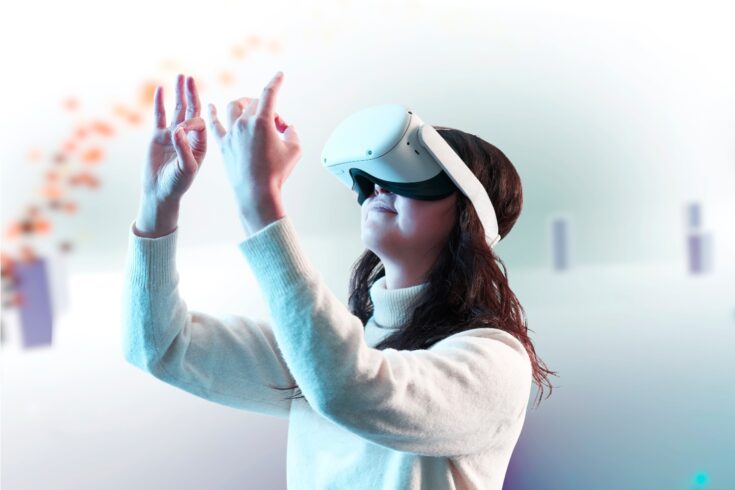As UK Research and Innovation (UKRI)’s key thought leader in the area, AHRC champions the meeting of creative content and technology. AHRC supports the core arts and humanities disciplines that drive the creative industries – from architecture and design to the visual and performing arts.
The breadth of AHRC’s portfolio spans research and innovation about, with, and for the creative industries, and it is the widest of all UKRI’s councils. We are connected to university departments that offer both cutting edge research and important skills training for the industries. We support the gathering of essential evidence to support policy choices.
We catalyse the intersection of funding streams – several clusters have now won major grants from other councils, including the Engineering and Physical Sciences Research Council-funded XR Network+ led by the University of York, which will build on the success of the clusters. Bristol + Bath Creative R&D and Clwstwr both have welcome injections from the Strength in Places Fund. And in all these ways, we celebrate the intersection of the creative industries and the economy more generally.
Delivering economic value
UKRI has made substantial investments in the creative industries and the impact is evident. Let’s take the Audience of the Future and the Creative Industries Clusters programmes.

Future Fashion Factory, School of Design, University of Leeds, part of the Creative Industries Clusters funded by AHRC (credit: UKRI)
Audience of the Future delivered four demonstrator programmes showing the potential of creativity and technology in e-sports and immersive experience, and, memorably, in translating the brilliance of the Royal Shakespeare Company onto an interactive virtual platform.
The AHRC-led Creative Industries Clusters programme is a remarkably successful merging of research and innovation across nine centres of excellence. It is an illustration of how government interest in clustering expertise and seeking to focus on place as a critical component of investment can work brilliantly.
Over the past four years, the programmes have:
- supported over 906 businesses
- stimulated a total of £247 million in co-investment (representing £4 of co-investment for every £1 of public funding)
- trained 2,290 people
- created or safeguarded 3,495 jobs
- created 66 new international partnerships.
Economics is not everything – but it matters. In 2021, the creative industries were estimated to have been worth £104 billion to the UK economy, showing a positive rebound from the worst of the pandemic and with potential for growth, as Caroline Norbury of Creative UK has argued. With the right investment, the creative industries could create 300,000 new skilled jobs by 2025, while continuing to deliver a huge social and cultural dividend.
Developing the skills needed for the future
The connection with skills is critical – the creative arts teach skills which are transferable and resilient. High skilled occupations account for 83% of roles in creative industries and 95% of creative jobs in the creative economy, compared with 46% nationally.
Yet there are massive skills gaps – around 21 million people need to upskill digitally by 2030 as technological adoption grows. Over half of the people who need to retrain in the next 10 years (16 of 30 million) will need such skills. And we know all this partly because of the work of the Creative Industries Policy and Evidence Centre in pulling this data together and analysing trends and gaps.
If you need any demonstration of the relevance of this argument, just take a look at the extraordinary testimony of the impact of Future Screens Northern Ireland in a recent Science Committee session in Belfast. It is clear that the creative industries have been transformational not just economically, but also socially.
The creative industries are not the only preserve of creativity or digital literacy, but they are immensely attractive and innovative places to grow and develop those skills. This can be seen in the potential of gaming platforms in innovation and education, and the success of InGame in both sides of this critical equation as an excellent example.
Linking education and industry
This makes evident the critical linkages between education and industry. Further and higher education must work better and more closely with industry to demonstrate their interconnected roles and success in producing a skilled workforce fit for the challenges of today.
A super example is music. The government has recently committed to supporting music in schools and has flagged the need to join up with music research. However, as we recently heard from Jamie Njoku-Goodwin at UK Music, music is now about so much more than a performer and an instrument. The need for profound digital literacy, from marketing and monetising to making, is clear.
The same point was made for writing by Claire Malcolm of New Writing North at a panel of Shared Futures on Levelling Up. As Claire noted, we need to get better at recognising and evaluating the enormous contribution of creative writing to our economy. Just as one index, according to the Publishers Association:
- the UK publishing industry has a turnover of £6 billion, with export income accounting for almost 60% of revenues
- the UK is the largest exporter of books in the world
- the publishing industry directly employs 29,000 people in the UK and supports more than 70,000 jobs
- the industry’s exports also generate a £1.1 billion trade surplus annually, reducing the UK’s trade deficit by 2.2%.
But all this rests on the vibrancy of our education sector, not just in teaching music or English, but in providing the wide array of skills, generic and specific, that industry needs. If we can get that relationship working better, the frankly daft idea that creative degrees are not jobs-facing and do not make a return to the economy could be put to rest for good.
Our profound commitment
So, what are we doing to protect and extend this UKRI investment?
First, AHRC will continue the funding of the Creative Industries Policy and Evidence Centre, allowing it to continue to underpin the sector with sharp, independent and impactful analysis. This is already being used extensively to support the Department for Digital, Culture, Media and Sport Creative Industries Sector Vision, due this autumn.
Second, we are delighted to announce that later this year we will launch the opportunity inviting applications to host Convergent Screen Technologies And performance in Realtime (CoSTAR) facilities. CoSTAR is a six-year investment with a commitment of £24.2 million over the next three years to establish a national, distributed research and development (R&D) infrastructure for the screen and performance sector. This is a major step forward for AHRC and for the screen and performance industry, providing access to facilities and expertise, and offering opportunities for collaboration, knowledge exchange and experimentation with limited financial risk.

InGAME research and development centre based in the heart of the Dundee video games cluster, part of the Creative Industries Clusters programme, funded by AHRC (credit: UKRI)
Third, AHRC will work with existing clusters and partners in UKRI to support stability and continuity of these hugely successful projects. Already, Clwstwr and Bristol and Bath have won Strength in Places funding.
Fourth, AHRC will continue to champion the role of the creative industries and design within UKRI. Gaming platforms for artificial intelligence development, the role of creative content in shifting behaviours around food, energy use and climate change, and the place of design thinking at the heart of everything we do, are just some examples. There are more exciting projects and announcements to come!
I believe UKRI has played a key role in the creative industries – but now is not the time to stop. Rather, we must build on the momentum we have created. I am delighted that AHRC is playing such a critical role, but it’s for all of us to work together now to build the creative economy and society we need.
Top image: InGAME research and development centre based in the heart of the Dundee video games cluster, part of the Creative Industries Clusters programme, funded by AHRC (credit: UKRI)




